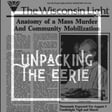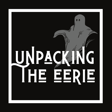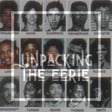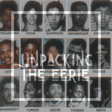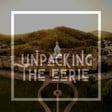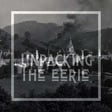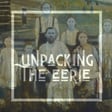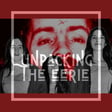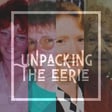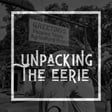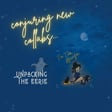Introduction to 'Unpacking the Eerie'
00:00:07
Speaker
And you're listening to Unpacking the Eerie.
00:00:10
Speaker
A podcast that explores the intersections of our dark and morbid curiosities through a social justice lens.
Introduction to Southeast Asian Legend
00:00:29
Speaker
So we are going back to Southeast Asia for this one, back to Malaysia.
00:00:34
Speaker
And I'm excited to do this one because it's a legend that I learned about when I was younger.
00:00:41
Speaker
I used to hear a lot of stories about it.
00:00:43
Speaker
So I was excited to dig into it, and I'm excited to share more.
The 1960s Singapore Encounter
00:00:49
Speaker
So it's the 60s, and there's a young man, and he's living in Singapore, and he has the reputation of getting into trouble because of how flirtatious and promiscuous he is.
00:01:05
Speaker
Take that as you will.
00:01:06
Speaker
He gets in trouble for it?
00:01:07
Speaker
He gets in trouble for it.
00:01:08
Speaker
That's refreshing.
00:01:10
Speaker
One night he goes out to a club and he gets kicked out for flirting with someone else's girlfriend.
00:01:16
Speaker
And he's walking home and it's late at night and it's a little gloomy.
00:01:21
Speaker
The moon's out and it's lighting his way home.
00:01:24
Speaker
And he's not typically the type to get scared.
The Mysterious Girl in the White Dress
00:01:27
Speaker
walking home and he doesn't typically meet anyone when he walks home and he does this pretty frequently as he's walking he catches a sweet and flowery scent um and he's not sure where it's coming from and it feels so out overpowering at first and then it just disappears and is replaced by the stench of rotting flesh oh no
00:01:53
Speaker
He then begins to hear something that sounds like birds squawking very loudly.
00:01:59
Speaker
And as he listens to it more closely, it sounds more like an aggressive, piercing, screeching noise.
00:02:07
Speaker
He has never heard anything like it before.
00:02:10
Speaker
And he tries to kind of look around to identify where the sound is coming from.
00:02:16
Speaker
And he sees that there's shadows moving through the trees and branches shaking.
00:02:22
Speaker
And then suddenly it stops.
00:02:24
Speaker
He looks at the base of the tree and there's a girl standing there smiling at him.
00:02:32
Speaker
She's dressed in an all white dress and she's pale and she has long black hair.
00:02:38
Speaker
She greets him with a friendly and warm tone.
00:02:43
Speaker
He sort of feels like he's under a spell because he didn't feel scared when he saw her, even though he knew what she was.
00:02:51
Speaker
She says, walk me home in a commanding way, not a request.
00:02:56
Speaker
And as they walk together, she asks him, do you find me pretty?
00:03:01
Speaker
And he said he found her very pretty.
00:03:03
Speaker
And it wasn't a lie.
00:03:04
Speaker
And it wasn't a pickup line like he usually uses.
00:03:07
Speaker
It was just him being honest.
00:03:09
Speaker
How old is this ghost supposed to be?
00:03:12
Speaker
They're both, I guess, around the same age.
00:03:15
Speaker
Like, I'm guessing young adult.
00:03:18
Speaker
Maybe like early 20s.
00:03:21
Speaker
So the girl told him that he was a charming boy and that he found that odd because they were the same age and that he was like referring to him as a boy.
00:03:31
Speaker
But she also says, but he has to be kind with that charm.
00:03:34
Speaker
She says she's been watching him.
00:03:37
Speaker
And she said she knew that he had a good heart.
00:03:40
Speaker
And she told him that her kind only killed those who deserved it.
00:03:46
Speaker
She then said, I hope we never meet again.
00:03:50
Speaker
I'm stealing this whole monologue one day.
00:03:54
Speaker
So Amanda approaches me.
00:04:00
Speaker
So then she says, I hope we never meet again.
00:04:03
Speaker
And then he realizes they've arrived at his house.
00:04:06
Speaker
And she keeps walking forward into the darkness, or more accurately, floating as he notices that she doesn't have feet below her dress.
00:04:15
Speaker
And the smell of the plumeria flower, which is also Ferungi pani flower, is still lingering in the air.
00:04:23
Speaker
So this is a story that I heard that's
Introducing the Pontianak
00:04:37
Speaker
And that's who I'm going to be telling the story about today is the Pantianak.
00:04:41
Speaker
I'll come back to this story at the end.
00:04:44
Speaker
But this story is based on a true experience of a man who came into contact with the Pantianak.
00:04:51
Speaker
And in Malayan Indonesian, she's known as a hantu, which is like a spirit, essentially.
00:05:01
Speaker
And like the legend is if you're a man walking around alone at night in Southeast Asia, you better beware of the Pantheonok.
00:05:09
Speaker
So that's kind of fun.
00:05:19
Speaker
She is a hantu, which is a spirit or a ghost.
00:05:23
Speaker
And hantus can be spirits of the dead, but they can also be demons.
00:05:27
Speaker
And in the traditional meaning, they can also be like the animistic nature of like objects that also have spirits in them or ancestral souls.
00:05:36
Speaker
And the Pontianic specifically is thought to be a ghost of a woman who either died during pregnancy or childbirth and aims to seek revenge on those who played a role in her death.
00:05:49
Speaker
I see why you said I would like it.
00:05:52
Speaker
She's thought to lure unsuspecting men to scare them and take revenge.
00:05:57
Speaker
Signs that she might be near are the sound of an infant crying, the smell of plumeria or furangipani flower, as well as the smell of rotten flesh or a decaying corpse.
00:06:12
Speaker
You might also hear shrieks or screams that sound almost like an animal.
00:06:17
Speaker
And you could even hear laughter.
00:06:20
Speaker
disembodied laughter.
00:06:22
Speaker
It's thought that the louder that the sounds are, the further away she is and the quieter they are, the closer she is because she likes to play tricks.
00:06:33
Speaker
She is said to look like a beautiful woman with pale skin, red eyes, long black hair, and a long white dress that's sometimes smeared with blood.
00:06:44
Speaker
Her features can also change as well as to look more vampiric and monstrous and scary.
00:06:51
Speaker
She kind of uses the beautiful woman look to lure people in and then she'll show the men like her true image, I guess.
00:06:58
Speaker
She's also said to have long nails and some descriptions of her says she also has fangs and has a similar aesthetic shared by Sadako in Ringu, who's actually based on Okiku.
00:07:13
Speaker
So connected back to... I was feeling this is very Okiku vibes.
00:07:18
Speaker
Also, there's like a Mexican... La Yorona?
00:07:24
Speaker
Yeah, I was thinking that La Yorona and I was also thinking about Okiku when I was researching about this legend.
00:07:31
Speaker
Oh, just you wait.
00:07:33
Speaker
Haunting men everywhere.
00:07:34
Speaker
Yes, as they should.
00:07:37
Speaker
So she's thought to appear when the moon is full and announces her presence through the sounds and smells that I mentioned earlier.
00:07:44
Speaker
She'll first seduce men.
00:07:46
Speaker
And once she has her victims caught, she transforms her features into her more monstrous form.
00:07:53
Speaker
before she kills them.
00:07:55
Speaker
It's thought she uses her long fingernails to remove their internal organs, eat them, and then suck their blood dry.
00:08:06
Speaker
The story that, the first ever story that I heard, that I honestly don't know if it's real or not, but it was like such a long story that this one person told a bunch of us about
00:08:17
Speaker
It, like, apparently they found this body of a man and all his blood had been drained and all his internal organs were gone.
00:08:24
Speaker
So I don't know if it was a real story.
00:08:28
Speaker
In some tellings, she said to eviscerate her victims with her hands, so with her long nails.
00:08:35
Speaker
Too bad they couldn't see what you just did there.
00:08:38
Speaker
Yeah, you can't see what I just did with my hands.
00:08:41
Speaker
In some other tellings, if the victims have their eyes open, she'll suck them out of their head.
00:08:47
Speaker
She'll suck their eyeballs out of their head.
00:08:49
Speaker
She's wild as fuck.
00:08:50
Speaker
And some superstitions state that she locates her prey by the scent of clean laundry.
00:08:58
Speaker
And because of this, some Malaysians refuse to leave any piece of clothing outside of their house overnight.
00:09:03
Speaker
Because they're scared.
00:09:04
Speaker
She hides in banana trees during the day.
00:09:08
Speaker
She's very strong.
00:09:09
Speaker
She can scale tall trees.
00:09:10
Speaker
And in some legends, she can even fly.
00:09:12
Speaker
Even though the Pantheonok legend comes from Malaysia and Singapore region, there are similar legends of creatures like her across Southeast Asia.
00:09:21
Speaker
So in Indonesia, Thailand.
00:09:23
Speaker
Brunei and the Philippines.
00:09:25
Speaker
Legend also states that you can stab her with a nail or a stake in the back of her necks and she will transform back into a subdued wife.
00:09:37
Speaker
Until someone removes the nail.
00:09:39
Speaker
What's that about?
00:09:43
Speaker
The, I guess, etymology of Ponty Anak is that word Anak means child and the word Ponty means tall tree, noting that she's a woman who died while pregnant.
00:09:54
Speaker
and lives in tall trees.
00:09:56
Speaker
However, not all women who die during pregnancy or childbirth become a Pontianac.
00:10:03
Speaker
Only the ones that die unhappy deaths, meaning due to domestic or sexual violence, turn into Pontianac.
00:10:11
Speaker
So, like, the ones that die because their husbands abused them, or their lovers abused them, or they were, you know, sexually assaulted, these are the women that turn into Pontianac to come back for revenge.
00:10:23
Speaker
You know what this is making me think about?
00:10:30
Speaker
I used to be on OkCupid.
00:10:33
Speaker
And they have this prompt that's like, when I die.
00:10:38
Speaker
I don't know what they want people to fill in the blank with.
00:10:40
Speaker
But I said, when I die, I will haunt rapists.
00:10:43
Speaker
That was my account.
00:10:44
Speaker
See, I told you that you would like her.
00:10:48
Speaker
She's very cool, actually, honestly.
00:10:51
Speaker
She's tragic, but... She's tragic, but, like, a bad bitch, for sure.
00:10:56
Speaker
So, like, rewinding back to, like, what the origins of the Pontianak are, the Pontianak is actually a city in the Kalimantan region of Malaysia, and it is the capital of the western Kalimantan region, and actually the name of the city is...
00:11:14
Speaker
And the information I found about this was like, very vague.
00:11:19
Speaker
So I honestly have like, I'm like very interested about like what this is actually about.
00:11:24
Speaker
But so like, that region of Asia has gone through a lot of colonization.
00:11:48
Speaker
in the late late 1700s his name was siref abdu rahman al-qadri and apparently he got there found that the city was infested with ghosts not infested yeah and so then he cut down all of the trees that the ghosts were apparently living in and used the wood to build a mosque and a palace for him to live in and then he was the first sultan and
00:12:14
Speaker
whose reign lasted from 1771 to 1808, and he was said to have been haunted by this ghost after he did that.
00:12:21
Speaker
And they named the city after the ghosts that were infesting the city when they got there.
00:12:27
Speaker
And the region is still believed to be haunted by the Pontianoc.
00:12:33
Speaker
This is fascinating.
00:12:35
Speaker
It's so interesting.
00:12:36
Speaker
So then I was looking at what is the history of just that region –
00:12:42
Speaker
And like, who were the people that were living there like before?
00:12:46
Speaker
And there has been evidence of humans in the Malay Peninsula from up to 40,000 years ago in the first century AD.
00:12:54
Speaker
And the indigenous people in this region are known as the Dayak people, which is a term that's actually adopted by Dutch and German to identify non-Muslim natives in the region.
00:13:06
Speaker
And it's a loose term for over 200 riverine and hill dwelling ethnic groups.
00:13:12
Speaker
So it's not like a specific tribe.
00:13:13
Speaker
It's like a umbrella term for native people in that region.
00:13:17
Speaker
And it's located in central and southern interior of Borneo, which is an island in Indonesia.
00:13:23
Speaker
And since the 19th century, it is a term that's continued to be used in Indonesia for indigenous non-Muslim tribes people.
00:13:32
Speaker
And in Malaysia, the term is reserved to the Iban that were previously known as the C-Diox because they live closer to the sea.
00:13:41
Speaker
These people, like I said, practice and believe what is contemporarily known as animism, which is the belief that objects, sacred places, animals, and natural phenomenon possess distinct spiritual essence.
00:13:55
Speaker
So it's one of the oldest and most commonly believed beliefs in a variety of cultures and practices across the world.
Pontianak as Anti-Colonial Figure
00:14:02
Speaker
And very present in indigenous Asian cultures.
00:14:05
Speaker
The belief is actually what leads indigenous groups to practice sustainability.
00:14:10
Speaker
In Malaysia, for example, only hunting and harvesting what they need for the environment and honoring that life exists within everything.
00:14:18
Speaker
And Shinto and Ainu also include some of these beliefs.
00:14:23
Speaker
And Kami's are actually similar to the, yeah, like Hantu's, I guess, like the spirits.
00:14:31
Speaker
There's so many connections to other things we've talked about.
00:14:33
Speaker
I know, which I didn't even know when I was, but when I was doing the research, I was like, Ooh, how fun.
00:14:40
Speaker
I like how we say that.
00:14:41
Speaker
And like, yeah, whoever's listening may or may not have context, but if you heard them all, then you do.
00:14:45
Speaker
Yeah, you're like, yeah, if you're listening, like, in order.
00:14:49
Speaker
Anyways, stories of the Pontianak have existed in mythical folklore, like, prior to colonization that began to take place in that region.
00:14:57
Speaker
And colonization began around the 12th century when Muslim settlements from the Middle East began to colonize this part of Asia.
00:15:05
Speaker
And then it led to tension between Native folks and their belief systems and the traditions of Islam.
00:15:14
Speaker
And yeah, so legend has it that on October 23rd, 1771, this nobleman that I just mentioned was gifted the city.
00:15:23
Speaker
I don't know what the heck that means.
00:15:25
Speaker
Other legends say that he stumbled upon this island.
00:15:28
Speaker
And the city is located at the delta of the Kapuas River, which is one of the longest rivers in the region.
00:15:36
Speaker
And so it's a crucial point of trade between
00:15:38
Speaker
Malaysia to the island of Borneo, which is in Indonesia.
00:15:41
Speaker
Yeah, this I really was like, why does the story say that when he arrived, it was infested with ghosts?
00:15:48
Speaker
Like, does that actually mean that it was infested with ghosts?
00:15:52
Speaker
Or are they talking about something else?
00:15:54
Speaker
And I like tried really hard to like, research it.
00:15:58
Speaker
And I really couldn't figure it out.
00:16:01
Speaker
So then I was like, well, either it's like,
00:16:04
Speaker
they're being racist and it's about like indigenous people or it's like about it being a rainforest and it being full of trees and how it maybe feels really scary and filled with like spiritual energy to be in a place that's like covered in trees and which is why they call the trees down because they were like scared I don't know you know they're coming from the desert yeah so it's like a totally different landscape that's true so being all of a
00:16:35
Speaker
Yeah, I mean, I feel like that could be either way.
00:16:37
Speaker
Infested with ghosts is such a specific way of putting it.
00:16:42
Speaker
I'm just like, what were the stories?
00:16:43
Speaker
Like, what were the, what were the, what happened?
00:16:46
Speaker
Why did they say that?
00:16:47
Speaker
What do you mean, infested?
00:16:49
Speaker
What they do to you?
00:16:50
Speaker
Also, they live there.
00:16:53
Speaker
It's the ghost's home.
00:16:55
Speaker
If you're receiving some kind of energy, maybe you don't need to be there.
00:16:58
Speaker
That would be my cue to leave.
00:16:59
Speaker
Not take down the trees and build a house out of it.
00:17:04
Speaker
One of the things... Respect nature.
00:17:07
Speaker
Actually, one of the things that I read about just the Pontianoc legend, I read this, like, this person wrote this book about it called Alluring Monsters, the Pontianoc and Cinemas of...
00:17:20
Speaker
decolonization it's just a whole book that's about this legend and all the movies that have been made about it and it's like a film analysis book there's so much here there is she said her story illustrates the patriarchal violence that is part of colonization as well not just that but the violence against the land and the lack of understanding of the indigenous beliefs around animism
00:17:45
Speaker
That echoes stories all over the world.
00:17:50
Speaker
And then they just used the wood from the trees to build a mosque and a palace that are both still there.
00:17:56
Speaker
And you can visit them.
00:17:57
Speaker
Those are supposedly built by the original trees that were there.
00:18:01
Speaker
And then they, I guess, wanted to honor her in some way, which is why they named the city after her.
00:18:08
Speaker
But the concept of animism was viewed as superstition that should be discouraged in favor of Islam and rationalism.
00:18:16
Speaker
And so that she argues that like,
00:18:21
Speaker
that then poses the Pontianoc as an anti-colonial force that disrupts patriarchal, racist, and capitalist logics of post-colonial societies.
00:18:33
Speaker
Which I'll get into.
00:18:38
Speaker
So the reason that she was able to write this also, this whole book, is because the Pontianoc is like in so much popular culture because of,
00:18:47
Speaker
just the prevalence of her story and her legend.
00:18:50
Speaker
So it obviously started off with oral tradition and narrative tradition.
00:18:54
Speaker
And then in the fifties, it shifted to film and like Malaysian horror films also called Hantu films.
00:19:02
Speaker
And in 1965, Singapore separated into its own country.
00:19:07
Speaker
And actually in the late 1960s, the government banned the horror genre because of what I just said about like,
00:19:14
Speaker
in favor of rationalism and we're not going to have horror movies.
00:19:17
Speaker
So there was no horror movies that were allowed to be made in that region until the 90s.
00:19:25
Speaker
And then the ban was lifted at that point.
00:19:28
Speaker
And then Pontianoc movies started coming out again in the 90s.
00:19:31
Speaker
You typically direct-to-video movies.
00:19:34
Speaker
And then the early 2000s, there were some big-screen movies about her also.
00:19:39
Speaker
And yeah, that was around when restrictions were around...
00:19:43
Speaker
horror films were relaxed.
00:19:47
Speaker
Anyway, like, I feel like that is definitely some very, like, interesting, like, history.
00:19:53
Speaker
And one more thing I'll add about that.
00:19:54
Speaker
There's a movie called Pontian, and in that movie, the Pontianics are the original owners and guardians of the land.
Pontianak in Modern Cinema
00:20:03
Speaker
And in this movie, the environmental trauma that is, like, contemporary in the movie, so, like, in the
00:20:10
Speaker
movie there's like past and present sort of going on and in the present the environmental trauma is like palm oil developers are like coming to destroy the land and they bring the Pontianux back and they kill the plantation owner to stop them from further deforestation and land destruction and that's like the plot of the movie which is super cool
00:20:32
Speaker
She's a feminist hero.
00:20:34
Speaker
Well, just you wait.
00:20:36
Speaker
She's about to be even more of a feminist hero.
00:20:38
Speaker
So, kind of shifting.
00:20:40
Speaker
This is a region... You know, sexual violence and domestic violence are prevalent across the world.
00:20:45
Speaker
Because patriarchy is present across the world.
00:20:48
Speaker
But in this region, sexual violence and domestic violence and patriarchy are rampant and the norm.
00:20:54
Speaker
And we talked a little bit about that in the Malaysian Airlines episode.
00:21:01
Speaker
Some stats that I looked into, there weren't a lot that were recent, but in a 1990 report, the Women's Aid Organization found that 40% of women older than 15 suffered some form of violence, and 68% of women who had experienced violence were beaten while they were pregnant.
00:21:21
Speaker
So I was like, oh, well, that makes sense.
00:21:23
Speaker
It's just a story that exists.
00:21:27
Speaker
And studies show that violence towards women often increases during pregnancy and postpartum period, which, yeah, I knew that too.
00:21:35
Speaker
Which is, you know, fucked up.
00:21:37
Speaker
But it's also a heavily underreported thing.
00:21:41
Speaker
So in 2015, a survey in Singapore found that one in three young people have faced some form of sexual violence.
00:21:50
Speaker
And in Malaysia, there are an average of eight rape cases reported daily in the country.
00:21:57
Speaker
And those are reported cases.
00:22:00
Speaker
And more than half of those are committed against minors.
00:22:08
Speaker
And then I found articles that were talking about how domestic violence reports went up significantly during the COVID-19 lockdowns, which we also know was a thing.
00:22:19
Speaker
So given all of this context, she's honestly like a really badass feminist icon and new writers and filmmakers are taking this legend and writing stories about her that are actually really beautiful and
00:22:32
Speaker
and subversive, so I'm going to highlight some of those.
00:22:36
Speaker
Amanda Nell-U's 2017 short film is called It's Easier to Raise Cattle, and it depicts a friendship between two countryside girls, one of whom is later revealed to be a Pontianak
00:22:49
Speaker
after she experiences sexual violence, she becomes one.
00:22:53
Speaker
But rather than focusing on her killings, the film pays more attention to how there's a bond between the two protagonists and lasts even after her friend finds out that she's a Pontianoc.
00:23:05
Speaker
So it's about friendship.
00:23:07
Speaker
It's like she finds out she's a survivor, yeah?
00:23:11
Speaker
And then she's like, I got you.
00:23:14
Speaker
I don't think you're a monster.
00:23:17
Speaker
You don't have to be ashamed.
00:23:19
Speaker
Multiple articles I read were talking about the concept of the monstrous feminine, which is a term that was coined by Barbara Creed in a book about film feminism and psychoanalysis.
00:23:33
Speaker
And it's a trope in horror movies where a monster who is frightful in nature is linked to her femininity, which is oftentimes her sexuality.
00:23:41
Speaker
And the Pontianic is a good example of this because of how she literally weaponizes her femininity to lure her victims to their death, which is ironic given that she is also killed and her origin story is based on her being killed because of her femininity.
00:23:58
Speaker
Dr. Alicia Izaruddin, who is a senior lecturer in gender studies at the University of Malaya, says the Pantianak isn't able to be a mother in a culture where reproduction is essential to a woman's identity, so she disrupts Malay ideals of femininity.
00:24:18
Speaker
She is also vindictive in nature and helps to provide a mythic counterpoint to the real life experiences of being a woman in patriarchal society.
The Pontianak's Evolving Narrative
00:24:28
Speaker
She has endured violence and suffering, avenges the real life crimes of women living in misogynistic societies, the things that they experience being femicide, rape, and domestic violence, and
00:24:40
Speaker
And Adeline Koo, who is a senior lecturer at Singapore's LaSalle College of the Arts, says she's a woman riding the injustices within a traditional society that has many constraints for women.
00:24:51
Speaker
The author of that book, Alluring Monsters, that I mentioned earlier, states, "...as a woman who returns from the dead, can fly, and often fights wrongdoers, the Pontianak is also a compelling figure of female agency, both in cinema and across Malay cultures."
00:25:08
Speaker
The Pantheonok gains a power not given to, quote, good Malay woman.
00:25:12
Speaker
Instead, she takes murderous revenge, often against men, and uses her supernatural abilities to protect her community.
00:25:20
Speaker
There is an obvious feminist potential in such a potent female figure, and female artists have vibrantly evoked the Pantheonok's power.
00:25:29
Speaker
One example of that is a writer, Tanya De Rosario, who's a Singaporean poet and who's also queer.
00:25:37
Speaker
She has a blog called Not Your Final Girls.
00:25:40
Speaker
It's a feminist blog and has written poems from the perspective of multiple monstrous feminine protagonists, including...
00:25:49
Speaker
I'm going to read the poem because it's pretty good.
00:25:52
Speaker
And she wrote it following a local rape case during which the defendant's senior counsel argued that the woman could have shut the gates, meaning crossed her legs, to prevent the assault from happening.
00:26:09
Speaker
So she wrote this poem in response to that.
00:26:11
Speaker
It's called Blame Pontianak Meets Taxi Driver.
00:26:14
Speaker
So sorry for not stopping the
00:26:17
Speaker
You're wanting while I still could for not pushing your hand from my knee, not resisting, not insisting you stop the car.
00:26:29
Speaker
So sorry for the lipstick on your collar and the blood on your seat for my beauty and your morals, both skin deep for the length of my teeth and the depth of your fear.
00:26:46
Speaker
I got a little chills.
00:26:46
Speaker
Yeah, a little chills.
00:26:48
Speaker
I did get a little chill.
00:26:48
Speaker
Yeah, I was like, ooh, I like that.
00:26:53
Speaker
And now I want some art, you know?
00:26:55
Speaker
I want some art for my house.
00:26:58
Speaker
Like a drawing of her.
00:27:00
Speaker
I could look at her every day.
00:27:04
Speaker
Be like Praise B, bitch.
00:27:08
Speaker
The author of this poem says she's assertive, uncompromising, unrelenting, solitary, neither a caregiver nor dependent.
00:27:17
Speaker
She roams the street alone at night without an escort and doesn't give a shit.
00:27:24
Speaker
Dr. Izaruddin also says, it says a lot about Asian society that we cannot grant agency to living women, but only when they're undead.
00:27:32
Speaker
So talking about how like her murderous violence is only viewed as legitimate because she's dead.
00:27:38
Speaker
But, you know, other people are saying, like, this can be interpreted as a form of power and freedom.
00:27:44
Speaker
Amanda Wu says, it's about letting your freak flag fly and not giving a shit.
00:27:52
Speaker
And she says, I feel great sympathy for the Pontianak.
00:27:56
Speaker
On first sight, you're afraid of her.
00:27:57
Speaker
But afterwards, you realize that the real monsters are humans and society.
00:28:02
Speaker
And all horror stories are created from this.
00:28:05
Speaker
The best horror movies, you know, they bring that point about.
00:28:11
Speaker
And we talk about that all the time.
00:28:12
Speaker
The way that real horror story, where the horror is actually the violence.
00:28:18
Speaker
Yeah, it's not the ghost.
00:28:20
Speaker
Yes, usually of men.
00:28:22
Speaker
It's not the ghosts.
00:28:24
Speaker
It's the patriarchy.
00:28:26
Speaker
There's a book that I actually started reading after I learned about it.
00:28:31
Speaker
It's called Ponty and it's by Charlene Teo.
00:28:35
Speaker
And it's a book that's about three Singaporean women's life being entangled with the Pontyanak myth.
00:28:41
Speaker
And she says she appears fragile, but is vicious when provoked.
00:28:45
Speaker
The Pontyanak mimics vulnerability and seeming gentility through her high pitched baby cries and frungy ponny scent.
00:28:53
Speaker
But try and take advantage of her and she'll suck your eyeballs out.
00:28:59
Speaker
I read this article on this website by Wenyi Li called Lady Macbeth, the Pontianoc and the Compulsive Power of the Monstrous Feminine.
00:29:08
Speaker
She says that like about all these stories that I was kind of just talking about the movie, the poem...
00:29:14
Speaker
that these stories, unlike older representations of the Pontianoc, re-center her in her own story, focusing on her grief, her injustices, and her rage.
00:29:24
Speaker
She is positioned in the context of her trauma, and she's conferred the agency of being centered in the narrative rather than the thing that lurks in the shadows.
00:29:33
Speaker
She isn't only a destructive force, but she's also a mother, a daughter, an aunt, a friend, a lover.
00:29:39
Speaker
Another quote I'll share from the filmmaker Amanda Nalou is,
00:29:45
Speaker
She can walk alone and not have to be accompanied by a man.
Real-Life Encounter and Its Impact
00:29:49
Speaker
She can be as beautiful and provocative as she wants.
00:29:52
Speaker
She can be extremely gentle or a massive flirt.
00:29:56
Speaker
But if you dare touch her without her consent, her claws will come out.
00:30:00
Speaker
Amanda is currently on a journey of dissecting and retelling Malaysian tales of female ghosts.
00:30:10
Speaker
So bringing it back to the story that I first shared in the beginning...
00:30:15
Speaker
It was said after that part of the story was shared, the story was actually shared by the son of the person that this supposedly happened to.
00:30:25
Speaker
And he said that his dad told him that after he had this experience with the Pontianic, he cleaned up his act.
00:30:32
Speaker
He started treating women with more respect.
00:30:35
Speaker
And he then very soon after that met the woman who would go on to be his wife only two months later.
00:30:42
Speaker
And he believed that had he not had this experience and he would not have met and gotten married to the woman that he's married to today.
00:30:49
Speaker
This woman just had to freak him out bad.
00:30:52
Speaker
She was like, I know you have a good heart.
00:30:55
Speaker
So stop fucking around because I'm watching you.
00:31:00
Speaker
He said, okay, okay.
00:31:05
Speaker
Thank you for sharing.
00:31:09
Speaker
Now I'm just thinking about all these ghost stories from all over the world of just usually there's similar threats for all of them.
00:31:19
Speaker
Something about... Colonial, patriarchal violence.
Critique of Patriarchal Folklore Elements
00:31:24
Speaker
And how all of these very colonized places happen to be the sites of the most patriarchal violence.
00:31:32
Speaker
And then, yeah, these ghost stories emerge from them.
00:31:37
Speaker
Yeah, we should cover more of them and see what the connections are.
00:31:42
Speaker
Yeah, but then they paint these women as evil, you know?
00:31:45
Speaker
The ghosts end up being these scary evil creatures.
00:31:46
Speaker
Like, oh, she's so scary with her long nails.
00:31:51
Speaker
And, oh, if you stick her with a nail in the back of her neck, she'll become a subdued wife again.
00:31:57
Speaker
like what's up with that who came up with that part of the legend a man obviously it was threatened he felt he felt a little scared about walking home alone at night i guess so i had to have i would love for like in a movie depiction of that that like a man tries to do that and she's just like what are you doing just pulls it out sucks his eyeballs out wow
00:32:23
Speaker
somebody's taking notes somebody's taking notes somebody take notes and put that in a movie if it's not already in one so oh wow that was so my bread and butter i know i told you i was like so excited like shane's gonna love this violin i didn't even know that it was gonna be like this when i started the research but then i was like oh my gosh there's like a there was a vice article and as soon as i thought of that i was like this is gonna be a great episode
00:32:46
Speaker
The Vice article was titled, Southeast Agerist Vengeful Man-Eating Spirits is a Feminist Icon.
Conclusion: The Pontianak as a Feminist Icon
00:32:54
Speaker
Yes, I want that on a t-shirt.
00:33:01
Speaker
She is a feminist icon.
00:33:03
Speaker
That's what the title of the episode is going to be.
00:33:06
Speaker
Vengeful Man-Eating Spirit is a Feminist Icon.
00:33:16
Speaker
And you know, I told you it was going to be a mini and it was a mini.
00:33:19
Speaker
You did a great job.
00:33:21
Speaker
I stayed within the time limit.
00:33:23
Speaker
It was comprehensive.
00:33:25
Speaker
And yeah, thank you.
00:33:27
Speaker
Yeah, I did my best.
00:33:28
Speaker
You did a great job.
00:33:33
Speaker
Thanks for listening and for supporting us.
00:33:35
Speaker
You can find us on Instagram and Facebook at Unpacking the Eerie, on Twitter at Unpack the Eerie, and on our website at www.unpackingtheerie.com.
00:33:48
Speaker
Yes, and special thanks to all of you who subscribe to our Patreon.
00:33:53
Speaker
As we've mentioned before, we do all the research for this, we edit, and we don't have any sponsorships or ads.
00:34:02
Speaker
So Patreon support is super helpful in just keeping this project sustainable, keeping the Buzzsprout subscription going, paying for the website, all the stuff.
00:34:12
Speaker
So thank you so much.
00:34:14
Speaker
Sari, Liz, Clifton.
00:34:16
Speaker
Jill, Victoria, and Lindsay.
00:34:18
Speaker
Lauren, Vivian, Valerie.
00:34:21
Speaker
Micheline, Montana, Katrina.
00:34:23
Speaker
Raina, Allie, Jake.
00:34:25
Speaker
Drithi, Daphne, and Katie.
00:34:27
Speaker
Vern, Meredith, H, and Vince.
00:34:31
Speaker
To April, Aaron, and Ellen.
00:34:33
Speaker
And to Brittany, Alyssa, and Meredith R. Yay, thank you so much.

